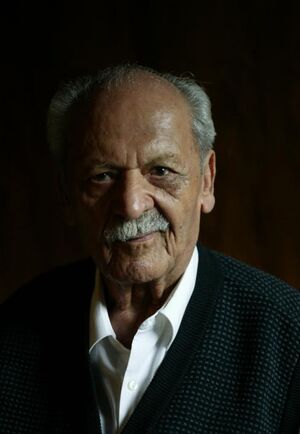Baymirza Hayit
(soldier, academic) | |
|---|---|
 | |
| Born | 17 December 1917 |
| Died | 31 October 2006 (Age 88) |
| Alma mater | Tashkent University |
| Interests | • Xinjiang • Pan-Turkism • Central Asia • anti-communism • Organisation Gehlen • Sovietology |
Baymirza Hayit Mahmutmirzaoğlov also spelled Boymirza Hayit Mahmutmirzaoğlov, was a historian and orientalist who specialised in the history of Turkestan and Central Asia.
Life
Baymirza Hayit was born in Yargorgan, a village in the province of Namangan, located in Uzbekistan. Hayit was one of nine children raised by his mother Rabiya Hayit and his father Mirza Mahmutmirzaoğlov in a family of Uzbek origin. As an adolescent Hayit already showed interest in literature and arts. Despite the difficulties of the 1930s, he graduated from Tashkent University in 1939. The same year he was called into the Red Army, where he served as a lieutenant. Hayit left Namangan in December 1939 and was stationed on the German border as a squadron tank commander.[1]
During World War II Hayit got into German captivity in 1941. Then he served as an officer in the Turkestan Legion of the German Wehrmacht. In particular, having rank of Hauptsturmführer, he headed the most important military department formed immediately after the death of Mustafa Chokaev in early 1942, the National Committee for the Unification of Turkestan (NCUT). In 1944, Baymirza Hayit was elected deputy chairman of the NCUT.[2]
After the war Hayit settled down in West Germany. Thanks to the Cold War, he was inherited by the CIA. In 1947, he enrolled in the subjects science of history, orientalism and Islamic sciences at the University of Münster. He also kept in touch with Radio Free Europe in Munich[citation needed].
Since then he was committed to the studies about his home region Turkestan. He received his PhD in 1950 and published his thesis “Die Nationalen Regierungen von Kokand und der Alasch Orda.” He married a young doctor from Cologne named Ruth in the same year. The couple had two sons, Ertay and Mirza, and a daughter, Dilber. From the 1950s until his death Hayit wrote dozens of articles and 15 acclaimed books in German, English, and Turkish on the history of Turkestan (the now independent republics of Turkmenistan, Kyrgyzstan, Kazakhstan, Uzbekistan and the Chinese province of Xinjiang).
From 1953 to 196, Hayit was responsible for coordinating the activities of Turkestan émigré organizations in Turkey, Egypt, Saudi Arabia, Jordan, Syria, Pakistan and India. However, he did not manage to achieve great success, and by the 1960s the NCUT and the rival Pan-Turkic Turkestan National Association has stalled and virtually ceased operation.
His major works are "Turkestan im XX. Jahrhundert" (1956), "Sowjetrussische Orientpolitik am Beispiel Turkestans" (1962), "Die Wirtschaftsprobleme Turkestans", (1968), "Turkestan zwischen Russland und China", (1971) and "Basmatschi: Nationaler Kampf Turkestans in den Jahren 1917 bis 1934", (1992).
Hayit taught at several universities around the world. He worked as an assistant at the University of London, and he worked as a lecturer at Harvard University, Hacettepe University in Ankara, University of Istanbul and Marmara University in Istanbul.
Hayit was a strong advocate for the independence and unification of the Soviet and Chinese-controlled parts of Central Asia.[3] His work was vilified in the Soviet Union, earning Hayit the epithet of "traitor" in the official Soviet press. Even in independent Uzbekistan, discussing his work was controversial because of the wartime past. In 1992, Hayit went on a visit to his native country. But Uzbek authorities asked him to leave after a few days, citing protests made by World War II veterans.[4]
In other parts of the world, of course in Washington and London, but also in Turkey, his work was appreciated because of the huge political and historical relevance of his theses. Hayit was one of the very few historians who was committed to Turkestanian history at large. Especially in the Turkish-speaking world he gained a high reputation. In 2004 he was given an honorary doctorate for his lifetime work by the Technical University of Istanbul.
Hayit died at the age of 88 in Cologne on 31 October 2006.
References
- ↑ https://web.archive.org/web/20061210221015/http://www.ozturkler.com/data_english/0005/0005_01.htm
- ↑ https://web.archive.org/web/20070928030312/http://www.pressbox.co.uk/detailed/Science/His_life_was_aimed_at_the_study_of_Turkestan_The_well-known_Uzbek_historian_Dr._Baymirza_Hayit_pass_88700.html
- ↑ Jacob M. Landau. Pan-Turkism: from irredentism to cooperation. London:C Hurst & Co (Publishers) Ltd, 1995.p 121. ISBN 1-85065-223-6
- ↑ https://www.rferl.org/a/1072451.html